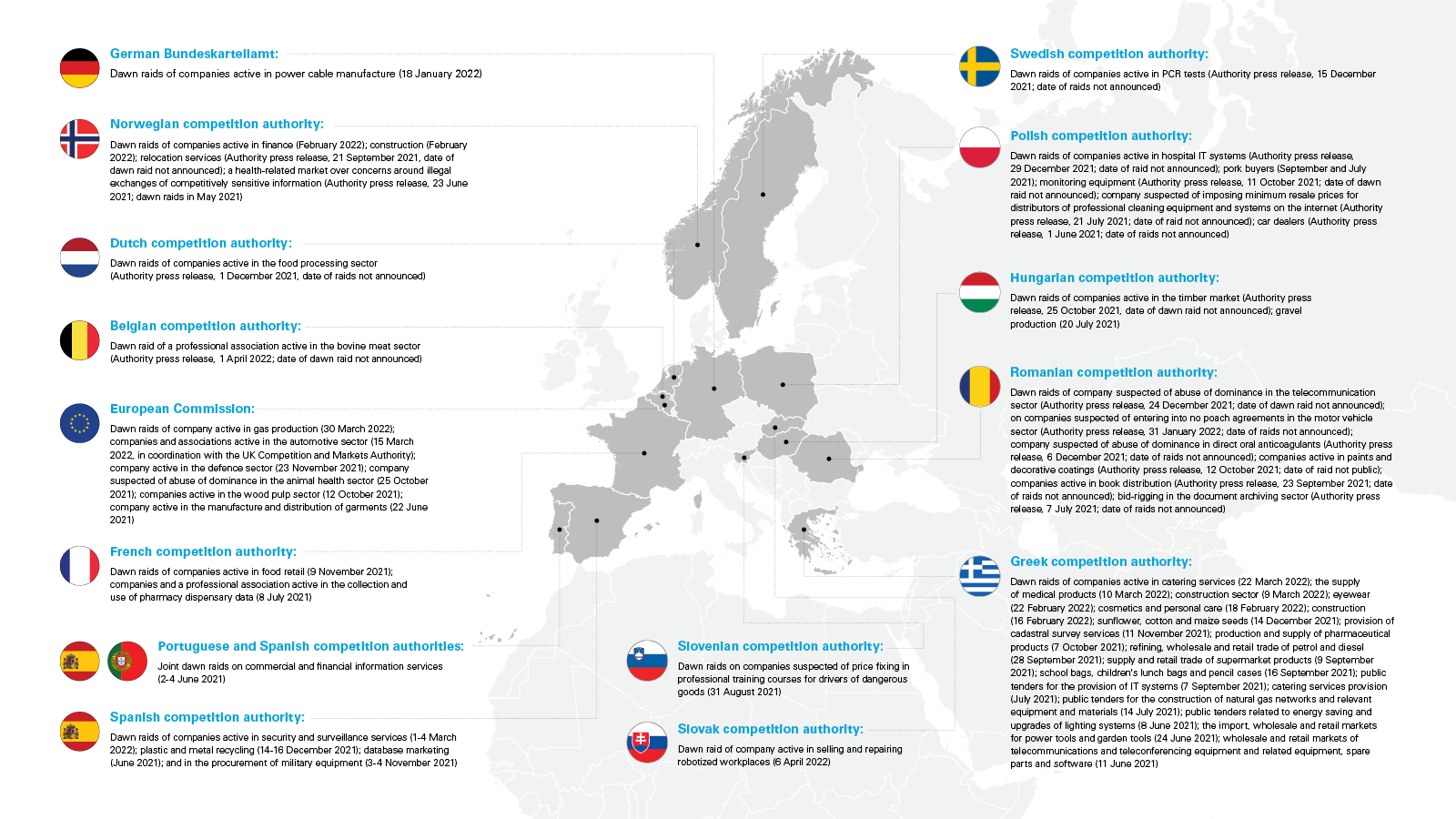
Competition authorities around the world suspended surprise on-the-spot inspections (dawn raids) for more than a year during the COVID-19 pandemic. However, since summer 2021, the European Commission and several European national competition authorities have fully revived dawn raids across a wide range of sectors. The authorities' investigations focus on traditional cartels and abuses of dominance, as well as a broader range of suspected activity, such as no-poach and wage-fixing agreements.
This has been demonstrated by the recent coordinated activity from the EU Commission and the UK's Competition and Markets Authority against the automotive sector in March 2022. It was announced that antitrust officials had conducted dawn raids on car manufacturers due to suspected collusion in the collection and recycling of scrapped cars and vans. On 30 March 2022, Gazprom's German premises were dawn raided by EU officials (assisted by members of Germany's Federal Cartel Office). The European Commission is investigating whether Gazprom withheld gas production that could be released at lower prices and why it failed to fill up its EU operated storage facilities. It is also not excluded that the EC investigates whether Gazprom's behaviour led to excessive gas prices.
The reasons for the dawn raid comeback are two-fold: (i) there is a need to clear the backlog of planned inspections built up during the COVID-19 pandemic; and (ii) authorities are investigating whether current disruptions in the supply chain and increasing raw material, shipping and energy costs are due to potential competition law violations.
In light of this, companies need to ensure that their dawn raid procedures are updated, and adapt such procedures to address the changes in dawn raid practice following the COVID-19 pandemic and the new reality of employees working from home.
Also important to note is that the United Kingdom has left the European Union. Since the expiry of the Brexit Transition Period (which ended early in the COVID-19 pandemic on 31 December 2020), the European Commission no longer has the power to conduct surprise inspections in the UK nor to request that a UK competition authority conduct searches on its behalf. In the UK, competition dawn raids are now carried out by the Competition and Markets Authority or a sectoral regulator with concurrent competition powers. One side-effect of this evolution may be that EU authorities interested in the potentially anti-competitive conduct of a UK business might choose to conduct raids on the EU-based subsidiaries or affiliates of those UK businesses instead. However, despite any ongoing political differences between the EU and UK, their respective competition authorities continue to work closely with one another as shown by the coordinated dawn raids in March 2022 launching parallel investigations into suspected anticompetitive conduct relating to the recycling of old or written-off vehicles.
What are dawn raids?
Dawn raids are unannounced inspections to investigate suspected infringements of competition law. Dawn raids are possible at both business and domestic premises (with an appropriate court warrant). The authorities generally conduct dawn raids with a large number of inspectors from the European Commission and/or national competition authority, often at several company locations at the same time. With the exception of legally privileged documents, the inspectors are empowered to review all documents on (and accessible from) the company premises that fall within the scope of the investigation. This review can cover confidential paper files, personal notebooks or diaries of company personnel, as well as physical and electronic logs (including mobile phones, or encrypted electronic data on a drive or data stored in the cloud, such as WhatsApp chats).
The dawn raid comeback
At the peak of the COVID-19 pandemic, most authorities suspended dawn raids due to COVID-19 restrictions.
The landscape has now changed. Many authorities are actively conducting dawn raids, as the table below shows, which lists publicly announced dawn raids in the EU since June 2021.
Focus areas for the update of dawn raid procedures
Companies should revisit their existing dawn raid procedures. Particular areas to focus on include the following:
Company dawn raid contacts
As there may be less staff present in the office as a result of remote working, companies should consider carefully whether they have a list of senior internal contacts who are either likely to be in the office or can arrive very quickly, as first port of call contacts (IT, legal, etc.) in the event of a raid. The guidelines should include a number of alternative contacts in case of absence.
The potential for dawn raids at homes
Since many employees are now working at least partly from home, authorities may choose to conduct dawn raids at the domestic premises of certain individuals.1 Dawn raids of domestic premises have been rare in Europe to date, but the authorities may be tempted to use these powers more frequently in the future especially if hybrid working becomes an entrenched corporate working practice. Maria Jaspers, the head of the European Commission's cartel unit, stated at a recent conference2 that the European Commission had dawn raided the home of an employee at the same time as the company premises in one of its last raids3. She notes that it was more likely that the European Commission would make use of its powers to dawn raid domestic premises "to respond to the shifting trend and shifting nature in the working arrangement".
As a result of the heightened concern about invasion of privacy in the case of a dawn raid of domestic premises, competition authorities in Europe need a judicial warrant from a national court to conduct a dawn raid of a home. To acquire a court warrant, the authorities usually need to have a reasonable suspicion that business records related to the subject matter of the dawn raid are kept at the domestic premises.
Companies should ensure that they have specific guidelines in place for dawn raids at domestic premises, and that staff are trained. Company employees working in sales and/or preparing bids in response to customer tenders should be prioritized for training. Staff should be trained to assert their rights to privacy, and where applicable, legal privilege at the raid, especially with respect to private documents and photos which have been stored on work or private devices.
Know your legal rights
The powers of the competition authorities to conduct dawn raids are not without limits. There are a number of rights which persons and companies subjected to dawn raids have, including the right of privacy, the right not to self-incriminate, and privilege. Failure to exercise these rights can lead to broader search and seizure than was authorized.
The competition authorities may not undertake a "fishing expedition". In the Nexans case4, the EU General Court annulled a significant part of the inspection decision on the basis that that the European Commission did not have reasonable grounds for ordering a dawn raid concerning certain parts of its investigation. Nexans successfully argued that the need for protection against arbitrary or disproportionate intervention by public authorities in the sphere of private activities constitutes a general principle of EU law.
Staff should be trained regarding their rights during a dawn raid, as well as the limits to these rights, as failure to comply with the law can lead to fines for obstruction.
IT searches within a hybrid working model
The focus of a dawn raid will be on electronic files and data. With a greater number of employees working from home, it is more likely than in the past that the inspectors will request remote access to data stored on devices used for business purposes at home, including personal devices. It is important that staff – including IT staff – have been adequately trained to deal with these requests.
On-the-spot questioning
As staff may be remote working, the inspectors may want to interview staff remotely through video calls, or even possibly in person at domestic premises. Dawn raid guidelines should establish protocols for this questioning, and allow for in-house and/or external lawyers to attend any questioning sessions.
Health protection
Companies should ensure that inspectors abide by all applicable COVID-19 health protection measures.5 If the inspectors have not abided by applicable measures, this may constitute a legal reason not to allow the dawn raid to proceed. This is of particular importance as inspectors require close monitoring during the full duration of a dawn raid, which can last as long as three days.
Continued inspections
Because of health concerns arising from in-person presence, inspectors may be tempted to shorten inspections and copy data for later review at the authorities' premises.6 If documents are copied for later review, companies should ensure that appropriate safeguards are put in place to ensure that only relevant documents are placed on the investigation file, and legally privileged and personal data are adequately protected. Such safeguards may involve the companies' external lawyers being present at the authorities' offices to supervise the officials as they conduct searches on the copied data set (while respecting applicable COVID-19 measures).
1 The UK government is proposing to strengthen its powers in relation to the dawn raids of domestic premises, by giving the Competition and Markets Authority powers to "seize-and-sift" evidence when it inspects domestic premises under a search warrant. See Para. 1.131 of the UK Government's response to the consultation launched in July 2021 on "Reforming Competition and Consumer Policy", published on 20 April 2022. Seize-and-sift" powers allow the Competition and Markets Authority to remove material from the premises, where it is not practicable to decide on-site whether it should be seized, for subsequent review off premises. Currently, the CMA only has "seize-and-sift" powers when it is inspecting business premises under a warrant.
2 Keynote, GCR Live: Cartels 2022, Washington DC, 5 April 2022
3 Maria Jaspers said that the European Commission had not made public the dawn raid of the domestic premises in question to protect the privacy of the individual concerned.
4 Case T-135/09, Nexans France SAS and Nexans SA v European Commission.
5 In all its recent press releases regarding dawn raids, the European Commission notes that the inspections were conducted "in compliance with all coronavirus health and safety protocols to ensure the security of those involved."
6 The Court of Justice of the European Union has confirmed that the European Commission may continue dawn raids at the authority’s premises, by taking copies during a raid without first examining these on the spot (Case C-606/18 P Nexans SA v European Commission, judgment of 16 July 2020).
This article was first published in Law360. For further information, please visit: How Dawn Raid Procedures Differ Since COVID-19 - Law360
This publication is provided for your convenience and does not constitute legal advice. This publication is protected by copyright.

 View full image 'Dawn raids make a serious comeback' (PDF)
View full image 'Dawn raids make a serious comeback' (PDF)


